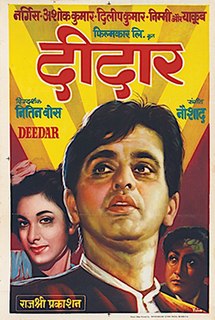
Shakeel Badayuni was an Indian Urdu poet, lyricist and songwriter in Hindi / Urdu language films.

Mohammed Rafi was an Indian playback singer and musician. He is considered to have been one of the greatest and most influential singers of the Indian subcontinent. Rafi was notable for his versatility and range of voice; his songs varied from fast peppy numbers to patriotic songs, sad numbers to highly romantic songs, qawwalis to ghazals and bhajans to classical songs. He was known for his ability to mould his voice to the persona and style of the actor lip-syncing the song on screen in the movie. He received six Filmfare Awards and one National Film Award. In 1967, he was honored with the Padma Shri award by the Government of India. In 2001, Rafi was honoured with the "Best Singer of the Millennium" title by Hero Honda and Stardust magazine. In 2013, Rafi was voted for the Greatest Voice in Hindi Cinema in the CNN-IBN's poll.

Madan Mohan Kohli, better known as Madan Mohan, was an Indian music director of the 1950s, 1960s, and 1970s. He is considered one of the most melodious and skilled music directors of the Hindi film industry. He is particularly remembered for the immortal ghazals he composed for Hindi films. Some of his best works are with singers Lata Mangeshkar, Mohammed Rafi and Talat Mahmood.
Shabaab is a 1954 Bollywood movie. Made in the Hindi language and directed by M. Sadiq, it stars Bharat Bhushan and Nutan.

Mere Mehboob is a 1963 Indian film directed by Harnam Singh Rawail and starring Ashok Kumar, Rajendra Kumar, Sadhana, Nimmi, Pran, Johnny Walker and Ameeta. The film became a blockbuster and took the number one position at the box office in 1963. A Muslim social film, it drew a background from Aligarh Muslim University, Aligarh and traditional Lucknow. The famous song "Mere Mehboob Tujhe Mere" was shot in the University Hall and in a couple of places, one gets to see the University. The opening scene of the movie shows the famous residential hall and the associated clock tower; "Victoria Gate".

Dil Diya Dard Liya is a 1966 Hindi romance film based upon Emily Brontë's 1847 novel Wuthering Heights. The film is directed by Abdur Rashid Kardar and Dilip Kumar. The film stars Dilip Kumar, Waheeda Rehman, Rehman, Pran, and Johnny Walker. The music is by Naushad. The songs include "Koi Sagar Dil Ko Behlata Nahin", "Phir Teri Kahani Yaad Aayi", "Guzre Hain Aaj Ishq Mein", "Dilruba Maine Tere Pyar Mein". It inspired the 1983 Pakistani film Dehleez starring Nadeem, Shabnam, Afzal Ahmed and Agha Taalish and the 1985 Hindi movie Oonche Log. The film was Dilip Kumar's first outright flop in 15 years at the box-office.

Deedar is a 1951 Hindi-language romantic musical film directed by Nitin Bose, starring Dilip Kumar, Nargis, Ashok Kumar and Nimmi. It is a story of unfulfilled love, where the hero's childhood love is separated from him due to class inequalities. It is one of noted tragedies made in early Hindi cinema. It became a popular film of the Golden era and further established Dilip Kumar as the "King of Tragedy".

Sunghursh is a 1968 Indian Hindi film directed and produced by Harnam Singh Rawail. It is based on a short story Layli Asmaner Ayna in Bengali language by Jnanpith Award-winning writer Mahasweta Devi, which presents a fictionalised account of vendetta within a thuggee cult in the holy Indian town of Varanasi. The film stars Dilip Kumar, Vyjayanthimala, Balraj Sahni, Sanjeev Kumar, Jayant, Deven Verma, Durga Khote and Iftekhar. The film was the last one to see actors Dilip Kumar and Vyjayanthimala working together. They had worked in several films which performed well commercially; however, unlike their previous collaborations Sunghursh under-performed commercially and was declared "Below Average" at box-office.

Hulchul is a 1951 Indian Hindi-language drama film directed by S. K. Ojha and written by Hasrat Jaipuri. The film was produced by K. Asif with Mohammed Shafi-Sajjad Hussain as music directors and film song lyrics by Khumar Barabankvi. The film stars Dilip Kumar, Nargis along with K. N. Singh, Balraj Sahni, Jeevan and Yakub. It is a loose adaptation of Emily Brontë's 1847 novel Wuthering Heights.
Shabbir Kumar is an Indian playback singer, notable for his work in Hindi cinema. Known for his sweet, resonating vocal texture,Shabbir Kumar is an ardent fan of Mhd Rafi .He had Sung for Anil Kapoor, Govinda, Mithun Chakraborty,Sunny Deol, Chunky Pandey, Dharmendra etc.
"Apni Azadi Ko Hum Hargiz Mita Sakte Nahin" is a popular song from the 1965 film Leader directed by Ram Mukherjee, starring Dilip Kumar and Vyjayanthimala. The song, written by Shakeel Badayuni, composed by Naushad, and originally sung by Mohammed Rafi, is a patriotic song about freedom and the independence from the British occupation of India.

Son of India is a Bollywood film released in 1962. This film was written and directed by Mehboob Khan, starring Sajid Khan, Kamaljit, Simi Garewal, Jayant and Kumkum. The music was composed by Naushad and with Shakeel Badayuni as the lyricist. It was a spiritual successor to Mehboob Khan's previous film, Mother India (1957).
The 14th Filmfare Awards were held in 1967, honoring the best Hindi films of 1966.









